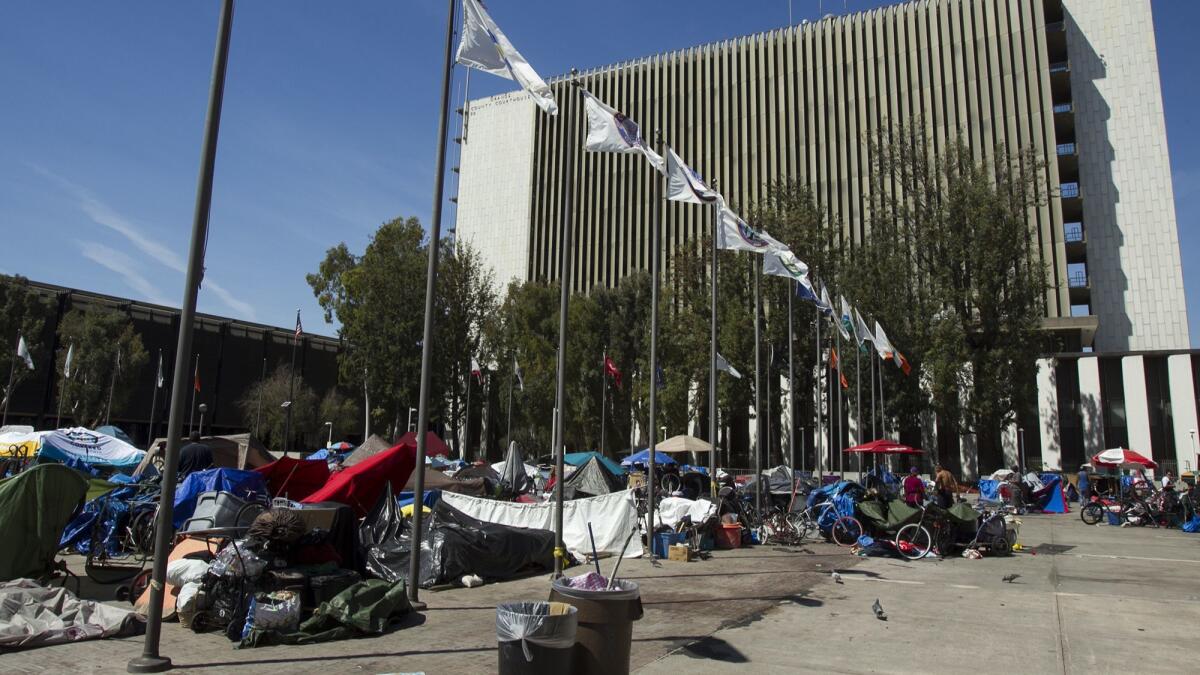Orange County’s needle exchange awaits state approval for mobile service

- Share via
After Santa Ana city officials shut down Orange County’s only needle exchange months ago, the program may return as a mobile service in Santa Ana, Anaheim, Orange and Costa Mesa.
The move — pending state approval — would widen the influence of the Orange County Needle Exchange Program, which formerly operated out of the Santa Ana Civic Center until city officials denied the group’s permit application in mid-January, citing an increased number of discarded syringes in the area.
Dallas Augustine, a board member of the needle exchange, said the group submitted an application to the California Department of Public Health on March 23 to hand out syringes and other harm reduction supplies out of a van in the four cities.
The needle exchange could operate from 10 a.m. to 5 p.m., a minimum of four days a week, Augustine said. The group formerly set up a table at the Civic Center for a few hours every Saturday afternoon, serving hundreds of homeless people who lived in a sprawling encampment.
Homeless people were recently cleared out of the Civic Center so the city can conduct maintenance and cleanup of the area. The agreement — made in mid-March — is part of a federal lawsuit handled by U.S. District Judge David O. Carter.
Augustine said the group doesn’t have exact schedules of operation because it needs to determine when the best time is for clients at each location.
“If there’s the demand and we are able to do it, then this can be seven days a week,” Augustine said.
Three volunteers will usually run operations out of the van. Before the program had to close, it had a pool of about 200 volunteers.
Augustine said the group chose the cities because they were noted as hot spots for HIV and drug overdoses based on data from the Orange County Health Care Agency.
A 2017 report by the agency depicted Santa Ana as having the highest rate of HIV cases, while Orange and Costa Mesa also have high rates. Anaheim’s HIV rate has declined since 2014, though Augustine said the concentration of people who use drugs in that area is still very high.
Another 2017 report by the agency listed Anaheim as having the highest number of opioid overdose deaths, at 123, between 2011 and 2015. Next is Huntington Beach with 106, Santa Ana with 91, Costa Mesa at 65 and Orange at 56.
The sites where the van will operate are:
- Santa Ana: area bounded by East Fourth Street, South Grand Avenue, North Standard Avenue and East Chestnut Avenue
- Anaheim: area bounded by Riverside 91 Freeway, East La Palma Avenue, North Olive Street and North Anaheim Boulevard
- Orange: area bounded by West Katella Avenue, West Orangewood Avenue, Main Street and the Santa Ana River
- Costa Mesa: area bounded by West 18th Street, West 16th Street, Monrovia Avenue and the outer border of the Armstrong Petroleum building
Augustine said the group chose locations away from residential zones, in light industrial areas.
In an effort to combat the syringe litter issue that led to the shuttering of the group, Augustine said being open for more hours will allow people to have a better chance to dispose their used syringes with the needle exchange.
The group will also conduct walk throughs of the planned sites to gather discarded syringes. There will be a phone hotline and email address for people to report used needles.
“That way we can be directly informed and act on it,” Augustine said. “In the past, we weren’t informed of where the needles were being found so we were doing our best to do needle cleanup sweeps of where we thought they would be.”
The group will also continue handing out sharps disposal containers to clients.
Augustine said the needle exchange will continue partnering with the Solace Foundation and Radiant Health Centers — harm reduction groups that set up tables from 1 to 3 p.m. every Saturday at the Civic Center.
Solace administers the opioid overdose reversal drug, naloxone, while Radiant Health offers HIV and hepatitis C testing.
Augustine said the needle exchange will also give out naloxone and continue referring clients to housing and treatment centers.
The program can get up and running with the sole approval of the state public health agency, Augustine said.
Theresa Mier, California Department of Public Health spokeswoman who attributed information to the agency, said in an email that the needle exchange doesn’t need approval from the cities they plan to operate in. Although as part of the state agency’s authorization process, department officials will consult with local law enforcement and health officers.
The approval process is currently in a public comment period that ends June 25.
Comments can be sent to [email protected].
The formal listing of the Orange County Needle Exchange Program’s mobile service proposal can be seen at bit.ly/2nCoeCp.
Twitter:@benbrazilpilot
All the latest on Orange County from Orange County.
Get our free TimesOC newsletter.
You may occasionally receive promotional content from the Daily Pilot.




